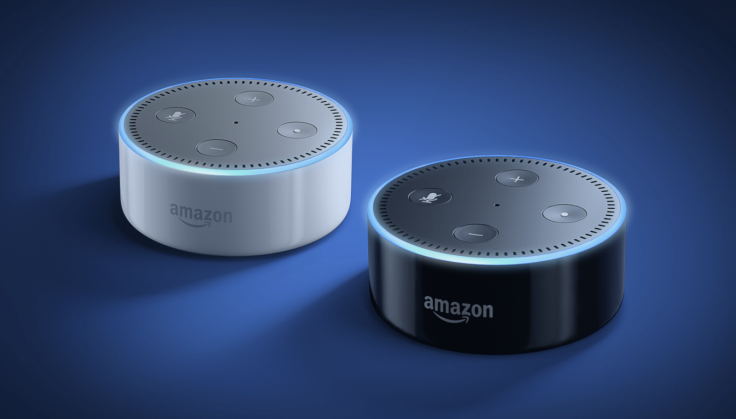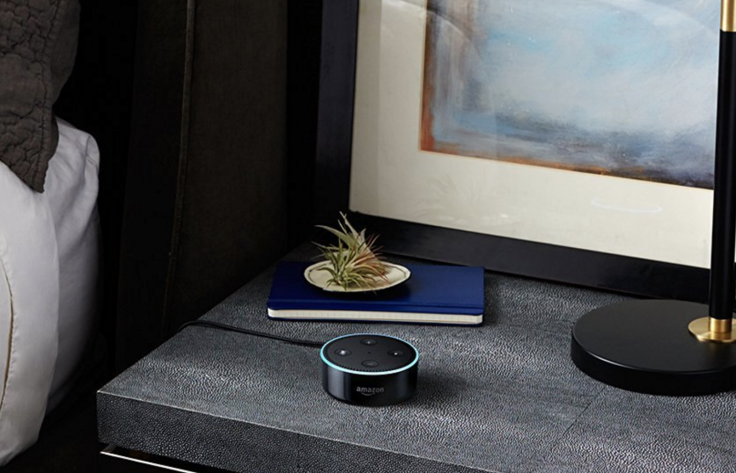Amazon Echo Dot with Alexa review: The future is here but still under construction
At £50 the Echo Dot is the cheapest way to bring Amazon's Alexa personal assistant into your home.

Amazon's new television adverts for its Alexa personal assistant focus on the £150 ($186) Echo speaker, but for us the star of the show is actually the £50 Echo Dot. This has exactly the same access to Alexa and her skill set, but is made to be connected to a speaker you already own.
Over Bluetooth or via a 3.5mm aux cable, the Echo Dot hooks up to just about any speaker or sound system and lets you control Alexa with nothing more than your voice. The Dot does in fact have its own internal speaker, and while this is passable for listening to Alexa read you the morning news, it isn't much good for music. But that's fine, because who doesn't have a speaker somewhere in their house?
What is Alexa and what can she do?
Think of Alexa being to Amazon as Siri is to Apple. She is a voice-activated personal assistant to help you search the internet, check your calendar, hear a weather forecast, tell jokes, set reminders and alarms, and of course play music. Alexa can also help you buy products from Amazon (of course), and control smart home accessories like internet-connected lights, coffee makers, thermostats and more.
Just say "Alexa..." and ask a question or issue a command for her to respond.
Amazon sells each Dot for £50, but multiple Dots can be installed in your household so there is a discount if you buy six or 12 at once. A Dot in each room is how Amazon wants you to live your life, but for the sake of this review we have just the one Dot, connected to a speaker and sitting next to the TV in our living room.
Setting up the Echo Dot is done via Amazon's Alexa app, available free on iOS and Android. Once set up, the app offers a list of suggestions for how to use Alexa, but more importantly is where you download and install new "skills".

These can be thought of as apps in their own right, with each enabling Alexa to do something new, often by tapping into a third-party service. For example, a National Rail skill can help you find train times, while Radioplayer lets you listen to radio stations and skills from Sky News and the Guardian offer up the day's news headlines. A JustEat skill lets you order takeaways, one called 7 Minute Workout acts as a personal trainer, and a skill from BMW means Alexa can lock/unlock your car and set the climate control before you leave the house.
Alexa can be set up to play tracks from Amazon Prime Music and Spotify, so subscriptions to both are needed to help Alexa play what you ask for.
The app also keeps a history of everything you ask Alexa to do including, a little creepily, audio recordings of what Alexa's microphones heard you say. For each entry the app asks if Alexa understood you correctly; tap yes or no to help her learn for next time.
No satisfaction
Alexa's ability to understand us was mostly impressive, but sometimes she became frustrating. Saying "Alexa, play the Rolling Stones" started a song called Rolling Stone (and not even Bob Dylan's Like a Rolling Stone) instead of music by the band. Annoyingly, the app claims Alexa heard correctly, but was unable to properly understand our request, or at least offer the option of playing a song or band of that name. Saying "play some music by the Rolling Stones" fixed this.
We were also unimpressed by Alexa's ability to recall facts and answer questions about famous people or popular subjects. Amazon suggests users try questions like "How high is Mount Everest" and "Why is the sky blue?", but often our off-script questions were met with silence.
Questions about celebrities also occasionally failed and all too often the blue light to indicate Alexa is "thinking" would spin then go off without her saying a word. In these situations we felt Siri offers a better reply, or at least apologises for not understanding. Alexa's silence sometimes made us think it wasn't working properly.
Alexa also struggles if people in the same room talk over each other after someone tells her to start listening. She can't be expected to understand two people at once, but she requires a very quiet room while listening; sometimes she would hear a question or instruction, but continue to listen to the television playing in the background, or a conversation taking place across the room.

Once, she got confused by several people talking at once and tried to buy three books from Amazon, all called Home. She can also not distinguish between voices, so whoever speaks will be given access to the Amazon, Spotify, Uber and JustEat accounts set up by the owner, and not their own. The Echo Dot can be muted with a press of a button, causing the blue light to turn red and stopping Alexa from listening. There are also volume buttons, but saying "Alexa, volume [1-10]" or "Alexa, louder/quieter" works too.
Living in a partially built future
This may sound like we are giving Alexa and the Echo Dot a hard time, but when she gets it right interacting with her feels like living in the future. Asking Alexa to play music (either by artist, track, album, genre or Spotify playlist) is a really nice feature when she gets it right, which she mostly does. No need to touch your phone or any hardware at all; just speak and the music starts, stops, and changes volume as you ask.
Requesting an Uber is equally fun, and once you have understood how she interacts with JustEat, re-ordering your most recent takeaway is incredibly simple. Her ability to tell jokes is about on par with Siri, as is her understanding of daft questions like asking her out for dinner. These serve little use, but act as a fun way to show Alexa off to curious friends without having her buy things off Amazon and order a cab.
We found music playback was by far her most popular and most-used feature, and her ability to learn our tastes began to shine through after a couple of days. Where initially saying nothing but "Alexa, [artist]" didn't work, after a few attempts and some yes/no feedback via the iPhone app, she learnt to play a certain track with just the name of the artist for direction.
Bought on a whim
We bought the Echo Dot on a whim, unsure if the initial novelty would wear off and leave Alexa unused, silent and covered in dust. But, a couple of weeks later, this hasn't been the case. The low price compared to the full-size Echo helps here, but so too does Alexa herself. She is still far from perfect, but crucially she works well enough; failing to answer questions can be a pain, but playing almost any music you could imagine (from Amazon Prime Music by default, or Spotify if you use it) is a truly great feature.
Plugging an iPhone into the speaker and mains, then using the "Hey Siri" command to wake it up works the same way in theory, but the Echo Dot's fixed position and constant awareness makes it the preferred option.
Sharing a home with the Dot and Alexa feels like living in a future which is partially built. The friendly and polite virtual assistant is already here, sat in every room of your house if you wish, and ready to help.
Alexa helps your life in a more meaningful way than Siri because her being in the room rather than in a phone in your pocket makes her somehow more approachable. We are much more likely to use Alexa than Siri to check the weather or order an Uber because the barrier to entry is so much lower; just speak and go.
That's the thing with Alexa and the Echo Dot: Where Siri and Google Now have always felt like fun gimmicks, Alexa is genuinely useful.
© Copyright IBTimes 2024. All rights reserved.






